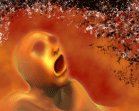The History Of The Ouija Board

Ouija boards, also referred to as witch boards and talking boards have been around since 1850. Before the invention of the Ouija board, if you wanted to contact a spirit you got to enjoy a practice called "table turning" or "table tipping." This is exactly what it sounds like. Mediums sit around a table that's positioned over an alphabet placed upon the floor. Spirits move the table around the room much like a huge planchette, spelling out various messages. It must have been quite noisy and rather tediuous I would imagine.
So you can imagine everyone's delight when the Ouija board was created. Instead of using a table to spell out words, you simply sat the small Ouija board ON the table. No more squished toes, broken vases, and scrapes on the floor.
During this time period variations of the Ouija board existed in different forms which were shared by spiritualists. This includes dial plates and other methods of contacting spirits. The first genuine patented talking board was created and sold in the late 1800's by Elijah Bond and Charles Kennard. Elijah Bond was a businessman and Charles Kennard an attorney. They probably didn't actually invent the Ouija board, but rather saw a way to make a profit from the board by patenting the idea.
Charles Kennard named the board Ouija. He claimed that during a session he was given that name by a spirit. According to Kennard the name means "good luck" in Egyptian. It doesn't, but who are we to argue with spirits? Many people pronounce Ouija "We-jee." The correct pronunciation is "Wee-jah."
After producing Ouija boards for less than a year and a half, production was given to William and Issac Fud. William Fud took over production in 1901 and remarketed the talking board under the name "Ouija." He also claimed to have been the sole inventor of the board and that the name was actually taken from the French word "Oui" and the German word "Ja." In other words the boards name was "Yes-Yes."
Ouija boards thrived under William Fud's guiding hand and thousands were sold. While there were many copycat boards, William Fud fought to protect the Ouija taking many of his competitors to court. This lasted until 1927 when he fell off the roof of his factory while overseeing the installation of a flag pole.
After his death William Fud's children took over the business until 1966 when they sold his estate, including rights to the Ouija board to Parker Bros. Hasbro currently owns the trademark but sadly, at this time they only have a glow in the dark version available for purchase. It would be neat to see them offer a deluxe version of the William Fud classic Ouija board.

